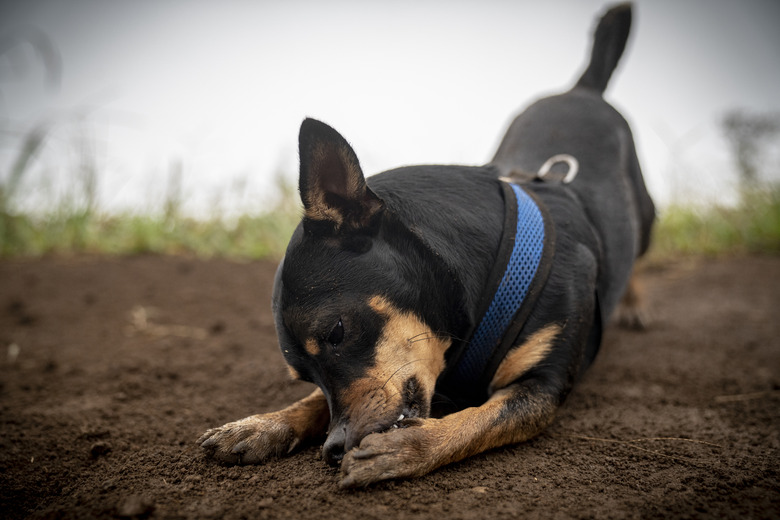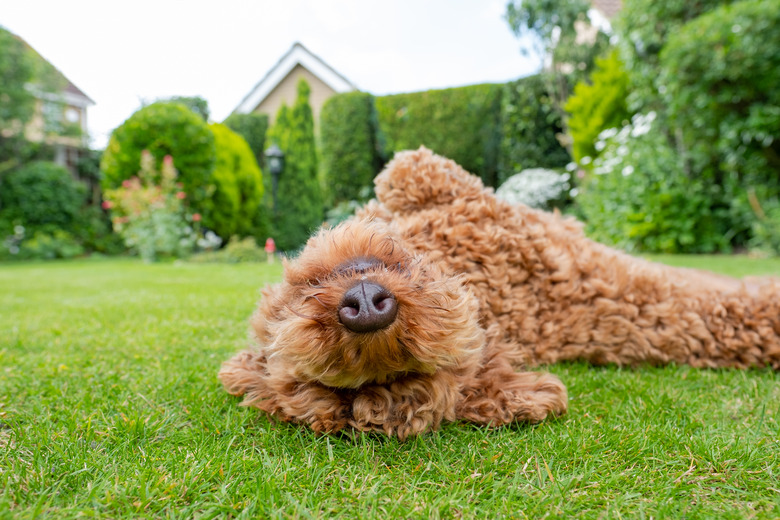Why Dogs Rub Their Muzzles After Eating
After your dog finishes her bowl of food, it might surprise you or even horrify you to see her using your light-colored couch for her dinner napkin as she strolls its entire length, carefully rubbing her food-stained whiskers on the fabric. Dogs with long hair on their face are the most prone to make use of the furniture, carpet, or even their paws to naturally clean crumbs and chewed food bits from around their mouth. There could also be other reasons for the activity.
There's something stuck in their teeth
There's something stuck in their teeth
No one likes the feeling of having food between the teeth, including your dog. Canine malocclusion — a condition where the teeth don't line up properly — can be particularly troubling to your pet during mealtime. The discomfort of food wedged between the misaligned teeth can cause your dog to rub his head or paw at his face.
Your dog's underbite might make him look adorable, but if he's rubbing his head after eating, it might warrant a trip to the vet for a dental checkup. Worrisome signs, such as extremely bad breath, bleeding from the gums after eating, or recoiling from being petted on the head, are signs that you need to take your pet for a visit sooner than later.
Your veterinarian can determine whether the problem requires a trip to a veterinary dentist. The canine dentist can remedy your dog's painful dental issues by realigning teeth with orthodontics or removing troublesome teeth.
Sensitivities and allergies
Sensitivities and allergies
Just like humans, dogs can have sensitivities to certain ingredients, and protein is most likely to be the cause. Beef, dairy, chicken, and eggs are the most common ingredients that can cause intolerances or allergies.
An itchy face is just one sign of potential food allergies. Chewing the footpads — which can look a lot like a dog rubbing her mouth with her paw — is a common symptom of food or environmental allergies. Ears and eyes might also be itchy, and your dog could have loose stools, diarrhea, or vomiting in some cases. If you're not sure if she's itchy, check your dog for symptoms of irritation, such as redness, tenderness, or goopiness around the eyes.
A trip to your veterinarian can determine whether the face rubbing is a sign of food allergies or something else, such as a reaction to an insect bite or environmental allergies. Should your vet suspect food allergies, she might prescribe a diet that changes both the protein and carbohydrates in your dog's food to remedy the problem.
When your dog rubs his face after eating
When your dog rubs his face after eating
If your dog has deep folds of skin around his mouth that stay wet most of the time, skin fold dermatitis could be the cause of the irritation. Simply wiping your dog's wrinkles and the folds around her mouth might relieve the cause of the behavior.
Determining the context of your dog's face rubbing is key. Does your dog put his head down sideways while doing a "play bow" and push it along the carpet or lawn with his tail end up in the air? This could be a sign of contentment or pleasure. Notice whether the face rubbing is accompanied by other pleasure signs, such as tail wagging or wiggling around excitedly. A dog who wants to rub his face against yours, whether it's after a meal or any other time, could be inviting reciprocal affection.
Listen for any whining or sighing sounds that accompany the face rubbing, as this can be a clue to your dog's mood. If your dog seems to be out of breath or having trouble breathing, this could be a clue to a severe allergic reaction. Call your veterinarian immediately if this or any other symptoms seem off from your dog's normal behavior. Did you just recently adopt a dog? An introductory visit with your veterinarian is vital to establishing what is normal for your pet.
References
- VCA Hospitals: Malocclusions in Dogs – When Teeth Are Malaligned
- Purdue University College of Veterinary Medicine: Pet Health Tips: Dogs
- Loyola Marymount University: Dog to English Translation Chart
- Cummings Veterinary Medical Center at Tufts University: What Every Pet Owner Should Know About Food Allergies

